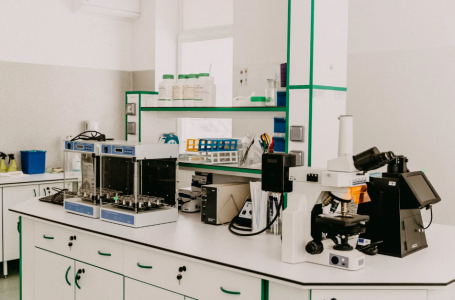A personal dispute at a major research lab is now raising serious safety questions
- Replies 0
Inside the shocking real-life meltdown that triggered a total shutdown at Fort Detrick—and why it should concern all of us.
It sounds like something out of a Hollywood thriller: a classified lab, a secret feud, and a moment of sabotage with potentially catastrophic consequences.
But this isn’t fiction.
It’s unfolding right now inside one of the most secure biological research labs in the United States—and the fallout could have been devastating.
Tucked away in Maryland, the Integrated Research Facility at Fort Detrick is one of just a dozen BSL-4 labs in the country—where researchers in full hazmat suits study pathogens like Ebola, Marburg, and Lassa virus.
These are some of the most lethal microbes known to science, and the facility’s strict protocols are designed to contain them at all costs.
But in late April, everything stopped.

According to multiple sources, the lab was shut down after a “lover’s spat” between two contract scientists spiraled into sabotage. One reportedly punctured the other’s protective suit during an argument—an act that, if confirmed, could have led to lethal exposure.
Lab director Dr. Connie Schmaljohn was placed on administrative leave for allegedly failing to report the incident promptly.
The Department of Health and Human Services (HHS) ordered an emergency “safety stand-down”—halting all research, locking away the pathogens, and limiting access to essential personnel only.
Also read: Free measles vaccinations just got harder to find—here’s what’s behind the closures
While the situation was contained before anyone became ill, the incident exposes a chilling vulnerability: our greatest biological threats don’t always come from terrorists or foreign labs—they can come from inside.
It’s not the first time Fort Detrick has drawn scrutiny. In 2018, a failure in wastewater management potentially released anthrax-contaminated water into a nearby river.
No infections were reported, but the close call highlighted how even world-class facilities aren’t immune to mishaps.
And of course, COVID-19’s origins remain under investigation. Both the FBI and CIA now acknowledge it's plausible that the virus escaped from a lab in Wuhan, though conclusive evidence remains elusive.
Regardless, the pandemic has focused global attention on the risks of biosafety failures—and the enormous cost of getting it wrong.
Also read: New twist: China just made a surprising claim about where COVID-19 really came from!
BSL-4 labs operate under some of the strictest safety standards on the planet. Researchers wear positive-pressure suits and pass through multiple containment zones just to enter. Yet no system is foolproof—especially when human emotion, misconduct, or carelessness enter the equation.
That’s what makes this situation so alarming. A romantic feud turned vengeful act isn’t just workplace drama—it’s a potential biosecurity disaster.
With 168 employees and a mission to understand and contain the world’s deadliest diseases, the Fort Detrick facility is vital to national and global health. But this scandal is a reminder that safety relies not just on equipment and training—but on trust, ethics, and clear-headed leadership.
The lab remains shut down while HHS investigates. Officials say the facility will only reopen once “safety culture” has been fully restored. That means ensuring personnel are not just technically qualified—but emotionally and ethically fit for the job.
The incident also raises broader questions about oversight. If a moment of spite can potentially compromise an entire high-containment lab, should we be doing more to monitor and regulate these facilities?
Should psychological evaluations or conflict resolution training be standard protocol in such high-stakes environments?
Read next: Public health at risk? FDA suspends key safety checks after layoffs

Have you worked in a high-stakes profession where trust and professionalism were non-negotiable? Do you believe these labs need stricter oversight—or more transparency? And how do we balance the urgent need for infectious disease research with the risks that come with it? Share your thoughts, concerns, and experiences in the comments.
It sounds like something out of a Hollywood thriller: a classified lab, a secret feud, and a moment of sabotage with potentially catastrophic consequences.
But this isn’t fiction.
It’s unfolding right now inside one of the most secure biological research labs in the United States—and the fallout could have been devastating.
Tucked away in Maryland, the Integrated Research Facility at Fort Detrick is one of just a dozen BSL-4 labs in the country—where researchers in full hazmat suits study pathogens like Ebola, Marburg, and Lassa virus.
These are some of the most lethal microbes known to science, and the facility’s strict protocols are designed to contain them at all costs.
But in late April, everything stopped.

Inside the shocking real-life meltdown that triggered a total shutdown at Fort Detrick. Image Source: Trnava University / Unsplash
According to multiple sources, the lab was shut down after a “lover’s spat” between two contract scientists spiraled into sabotage. One reportedly punctured the other’s protective suit during an argument—an act that, if confirmed, could have led to lethal exposure.
Lab director Dr. Connie Schmaljohn was placed on administrative leave for allegedly failing to report the incident promptly.
The Department of Health and Human Services (HHS) ordered an emergency “safety stand-down”—halting all research, locking away the pathogens, and limiting access to essential personnel only.
Also read: Free measles vaccinations just got harder to find—here’s what’s behind the closures
While the situation was contained before anyone became ill, the incident exposes a chilling vulnerability: our greatest biological threats don’t always come from terrorists or foreign labs—they can come from inside.
It’s not the first time Fort Detrick has drawn scrutiny. In 2018, a failure in wastewater management potentially released anthrax-contaminated water into a nearby river.
No infections were reported, but the close call highlighted how even world-class facilities aren’t immune to mishaps.
And of course, COVID-19’s origins remain under investigation. Both the FBI and CIA now acknowledge it's plausible that the virus escaped from a lab in Wuhan, though conclusive evidence remains elusive.
Regardless, the pandemic has focused global attention on the risks of biosafety failures—and the enormous cost of getting it wrong.
Also read: New twist: China just made a surprising claim about where COVID-19 really came from!
BSL-4 labs operate under some of the strictest safety standards on the planet. Researchers wear positive-pressure suits and pass through multiple containment zones just to enter. Yet no system is foolproof—especially when human emotion, misconduct, or carelessness enter the equation.
That’s what makes this situation so alarming. A romantic feud turned vengeful act isn’t just workplace drama—it’s a potential biosecurity disaster.
With 168 employees and a mission to understand and contain the world’s deadliest diseases, the Fort Detrick facility is vital to national and global health. But this scandal is a reminder that safety relies not just on equipment and training—but on trust, ethics, and clear-headed leadership.
The lab remains shut down while HHS investigates. Officials say the facility will only reopen once “safety culture” has been fully restored. That means ensuring personnel are not just technically qualified—but emotionally and ethically fit for the job.
The incident also raises broader questions about oversight. If a moment of spite can potentially compromise an entire high-containment lab, should we be doing more to monitor and regulate these facilities?
Should psychological evaluations or conflict resolution training be standard protocol in such high-stakes environments?
Read next: Public health at risk? FDA suspends key safety checks after layoffs
Key Takeaways
- A top US lab studying deadly pathogens was shut down after a personal conflict led to a serious safety breach.
- One scientist allegedly damaged a colleague’s protective suit during an argument, prompting fears of potential virus exposure.
- The lab director has been placed on administrative leave, and all research is paused pending a full investigation.
- The shutdown at Fort Detrick highlights growing concerns about biosafety—and the human factor behind high-tech containment.






